Analytic PhilosophyPhilosophy of Science |
What was Karl Popper’s theory of falsification? |
Popper (1902–1994) did not think it mattered how hypotheses were inspired or arrived at, so induction was not necessary for their formation. In fact, he thought that the more bold and imaginative a hypothesis, the more scientific it was because it would be possible to specify what would falsify it. He argued that science progresses through a process of falsification, or, if hypotheses withstand crucial tests, then “corroboration,” but never confirmation. Hypotheses or theories that cannot be falsified, such as religious, Marxist, or Freudian claims, according to Popper, could never qualify as scientific claims.

Karl Popper claimed that hypotheses can never be completely confirmed because we can’t know what the future will hold with certainty (AP).
